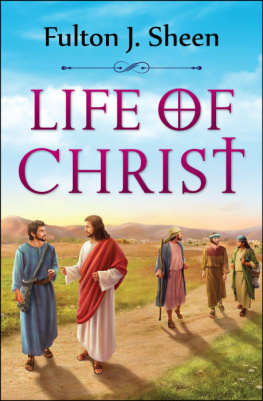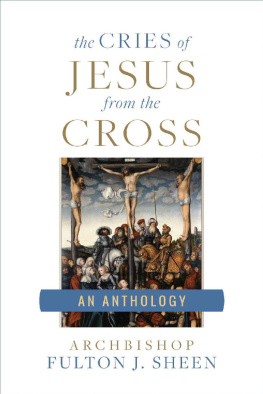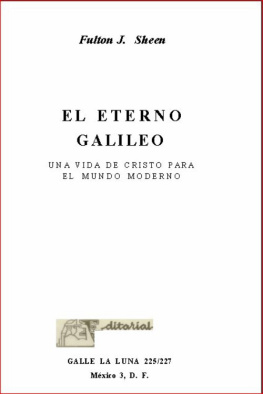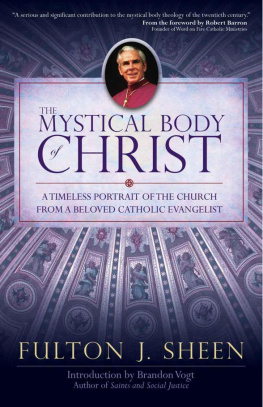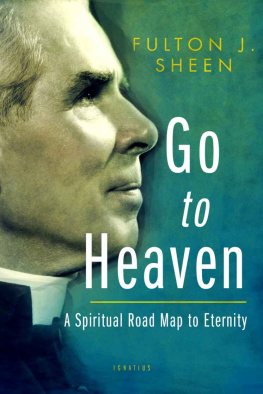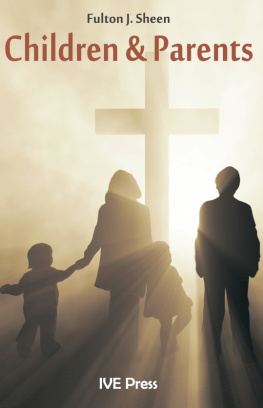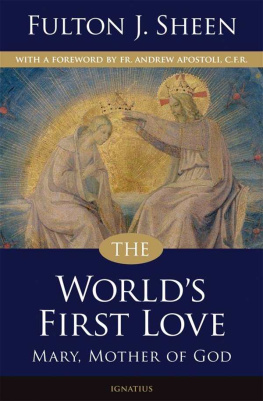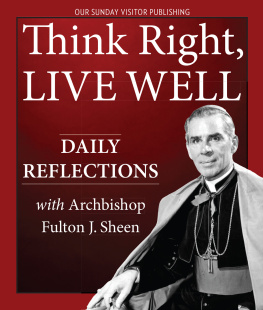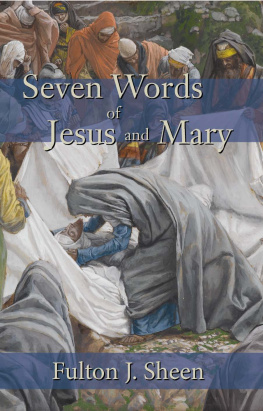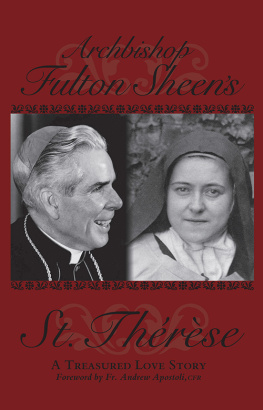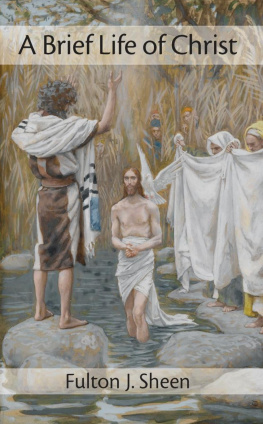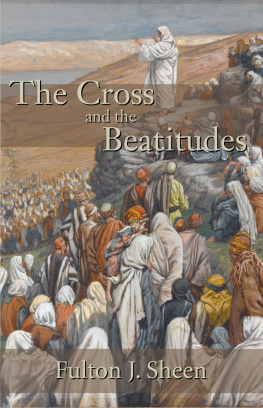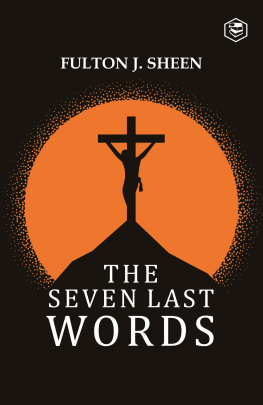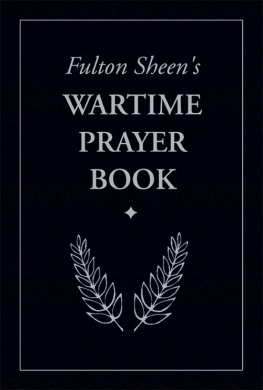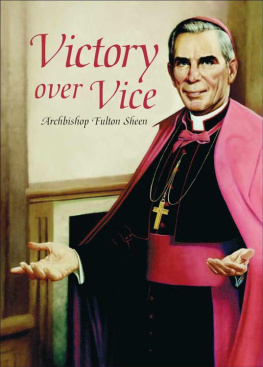Fulton J. Sheen - Life of Christ
Here you can read online Fulton J. Sheen - Life of Christ full text of the book (entire story) in english for free. Download pdf and epub, get meaning, cover and reviews about this ebook. year: 2020, publisher: Digital Fire, genre: Religion. Description of the work, (preface) as well as reviews are available. Best literature library LitArk.com created for fans of good reading and offers a wide selection of genres:
Romance novel
Science fiction
Adventure
Detective
Science
History
Home and family
Prose
Art
Politics
Computer
Non-fiction
Religion
Business
Children
Humor
Choose a favorite category and find really read worthwhile books. Enjoy immersion in the world of imagination, feel the emotions of the characters or learn something new for yourself, make an fascinating discovery.
- Book:Life of Christ
- Author:
- Publisher:Digital Fire
- Genre:
- Year:2020
- Rating:5 / 5
- Favourites:Add to favourites
- Your mark:
- 100
- 1
- 2
- 3
- 4
- 5
Life of Christ: summary, description and annotation
We offer to read an annotation, description, summary or preface (depends on what the author of the book "Life of Christ" wrote himself). If you haven't found the necessary information about the book — write in the comments, we will try to find it.
Life of Christ — read online for free the complete book (whole text) full work
Below is the text of the book, divided by pages. System saving the place of the last page read, allows you to conveniently read the book "Life of Christ" online for free, without having to search again every time where you left off. Put a bookmark, and you can go to the page where you finished reading at any time.
Font size:
Interval:
Bookmark:


OTHER BESTSELLING EBOOKS (NON-FICTION) |
Be What You Wish by Neville Goddard, ISBN: 9789388760782 |
Becoming a Writer by Dorothea Brande, ISBN: 9789389157291 |
Feeling is the Secret by Neville Goddard, ISBN: 9789389157307 |
How to Attract Money by Joseph Murphy, ISBN: 9789388760553 |
How to Develop Self Confidence and Improve Public Speaking by Dale Carnegie, ISBN: 9789388760416 |
How to Stop Worrying and Start Living by Dale Carnegie, ISBN: 9789388118675 |
How to Win Friends and Influence People by Dale Carnegie, ISBN: 9789388118682 |
Mein Kampf by Adolf Hitler, ISBN: 9789388760423 |
My Experiments with Truth by Mahatma Gandhi, ISBN: 9789388118538 |
The Art of Public Speaking by Dale Carnegie, ISBN: 9789388760850 |
The Art of War by Sun Tzu, ISBN: 9789388760560 |
The Autobiography of a Yogi by Paramahansa Yogananda, ISBN: 9789388118507 |
The Diary of a Young Girl by Anne Frank, ISBN: 9789388760430 |
The Knowledge of the Holy by A. W. Tozer, ISBN: 9789389157437 |
The Miracles of Your Mind by Joseph Murphy, ISBN: 9789388118880 |
The Power of Your Subconscious Mind by Joseph Murphy, ISBN: 9789388118897 |
The Quick and Easy Way to Effective Speaking by Dale Carnegie, ISBN: 9789388760942 |
The Richest Man in Babylon by George S. Clason, ISBN: 9789388118903 |
The Science of Getting Rich by Wallace D. Wattles, ISBN: 9789388760577 |
Think and Grow Rich by Napoleon Hill, ISBN: 9789388118910 |
Contents
Dedicated in Filial Affection to Mary the Triple Author
First as Mother Who Didst Give to the Son of the Living God
A Body with Which He Borrowed Human Guilt and Paid Back Death with Life
Then as Author of These Words about the Word for Only in Dark Hours When Gall with Ink Did Mix She Made the Writer See Christ and Crucifix
And Last as Author with the Spirit of Christ in Each Readers Heart Acting on Each Page as the Sweet Incendiary of That Love We Fall Just Short of in All Love
Preface
Satan may appear in many disguises like Christ, and at the end of the world will appear as a benefactor and philanthropistbut Satan never has and never will appear with scars. Only Heavens Love can show the marks of loves greatest gift in a night forever past. Actually, there are only two philosophies of life: one is first the feast, then the headache; the other is first the fast and then the feast. Deferred joys purchased by sacrifice are always sweetest and most enduring. The ancients taught that any prosperity or success enjoyed without suffering on the part of someone excited the displeasure of the gods. Lucretius tells of an Egyptian king who relinquished all relations with his friend Polycrates, the tyrant of Samos, because his prosperity had no flaws in it, something of bitterness which springs up in the midst of the fountain of sweetness.
Christianity, unlike any other religion in the world, begins with catastrophe and defeat. Sunshine religions and psychological inspirations collapse in calamity and wither in adversity. But the Life of the Founder of Christianity, having begun with the Cross, ends with the empty tomb and victory.
The Life of Christ differs from all other lives in many respects, three of which may be mentioned:
1. The Cross was at the end of His life in time, but at the beginning of it in the intent and purpose of His coming. Hence His biographers, who were martyred in witness to the truth they wrote, devoted one-third of the first three Gospels and one-fourth of the fourth Gospel to the events of His Passion and Resurrection.
2. As man did not come wholly out of nature, for man with his mind has a mysterious x which is not contained in his chemical and biological antecedents, so Christ did not come wholly out of humanity.
3. His legacy was not an ethic or a collection of moral precepts, nor an awakening to social sin because men would not hear of personal sin; it was a confrontation of human guilt with the forgiving love of God, which cost God something.
Hating sin, loving sinners; condemning Communism, loving Communists; despising heresy and loving the heretics; receiving the erring back into the treasury of His Heart, but never the error into the treasury of His Wisdom; forgiving sinners whom society already condemned, but intolerant of those who sinned and were not found out, He reserved His most scathing outbursts for those who were sinners and denied sin, who were guilty and said they had only a complex. Then it was that He Who wept in silence in the presence of human sorrow and an open grave, gave way to unrestrained outbursts of grief as He contemplated the doom and downfall of those who have moral cancer and refuse to use the remedy He purchased at a greater price than the blood of lambs and bullocks.
The modern world, which denies personal guilt and admits only social crimes, which has no place for personal repentance but only public reforms, has divorced Christ from His Cross; the Bridegroom and Bride have been pulled apart. What God hath joined together, men have torn asunder. As a result, to the left is the Cross; to the right is Christ. Each has awaited new partners who will pick them up in a kind of second and adulterous union. Communism comes along and picks up the meaningless Cross; Western post-Christian civilization chooses the unscarred Christ.
Communism has chosen the Cross in the sense that it has brought back to an egotistic world a sense of discipline, self-abnegation, surrender, hard work, study, and dedication to supra-individual goals. But the Cross without Christ is sacrifice without love. Hence, Communism has produced a society that is authoritarian, cruel, oppressive of human freedom, filled with concentration camps, firing squads, and brain-washings.
The Western post-Christian civilization has picked up the Christ without His Cross. But a Christ without a sacrifice that reconciles the world to God is a cheap, feminized, colorless, itinerant preacher who deserves to be popular for His great Sermon on the Mount, but also merits unpopularity for what He said about His Divinity on the one hand, and divorce, judgment, and hell on the other. This sentimental Christ is patched together with a thousand commonplaces, sustained sometimes by academic etymologists who cannot see the Word for the letters, or distorted beyond personal recognition by a dogmatic principle that anything which is Divine must necessarily be a myth. Without His Cross, He becomes nothing more than a sultry precursor of democracy or a humanitarian who taught brotherhood without tears.
The problem now is: Will the Cross, which Communism holds in its hands, find Christ before the sentimental Christ of the Western world finds the Cross? It is our belief that Russia will find the Christ before the Western world unites Christ with His Redemptive Cross.
For those who seek a strictly chronological Life of Christ in a geographical setting, we recommend as the best that of Giuseppe Ricciotti, The Life of Christ (Milwaukee: The Bruce Publishing Company, 1954). Our work does not concern itself with Biblical criticism, partly because this has been aptly treated in Ricciotti, Grandmaison, Lagrange, and others, and also because no critical theory endures much beyond a generation. A Bauer gives way to a Strauss; a Strauss to a Wellhausen; a Wellhausen to a Harnack and a Renan; both to a Schweitzer and a Loisy. When these latter theories lost popular support, there came Schmidt, Bultmann, Albertz, and Betram and others. But the readers who have followed the scientific and critical refutations of Bultmann by Leopoly Malevez, Ren Marl, and others, know that they are already losing popular support among Biblical scholars. But though a writer of the Life of Christ does not mention any of the above authors or theories, knowledge of them is nevertheless a prerequisite of writing. No form of criticism, even that of a Strauss, has failed to deepen the knowledge of those who must first know the Gospels technically and critically before they can give adequate treatment to a Life of Christ.
Next pageFont size:
Interval:
Bookmark:
Similar books «Life of Christ»
Look at similar books to Life of Christ. We have selected literature similar in name and meaning in the hope of providing readers with more options to find new, interesting, not yet read works.
Discussion, reviews of the book Life of Christ and just readers' own opinions. Leave your comments, write what you think about the work, its meaning or the main characters. Specify what exactly you liked and what you didn't like, and why you think so.

